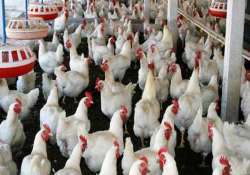India loses poultry case against US at WTO
Geneva/Washington: India has lost a case at the WTO, with the World Trade Organisation today ruling that Indian ban on import of poultry meat, eggs and live pigs from the US was “inconsistent” with the

Geneva/Washington: India has lost a case at the WTO, with the World Trade Organisation today ruling that Indian ban on import of poultry meat, eggs and live pigs from the US was “inconsistent” with the international norms.
India will have 12-18 months to implement this ruling, after which the US can begin exports of these products to India.
“The Appellate Body agreed with the Panel's finding that India's AI (avian influenza) measures are inconsistent ... because they are not based on a risk assessment,” WTO said. A WTO panel last year ruled that India's ban on imports of poultry products from US was inconsistent with global norms.
After hearing India's appeal against the ruling, the Appellate Body today said it has “found that the Panel did not, as India contended, act inconsistently”.
The Appellate Body also upheld the panel's findings that India's AI measures are neither “based on”, nor “conform to”, the relevant international standard.
It also endorsed the panel's finding that India's AI measures violated global norms on the grounds that the prohibition was limited to just one country and not to all imports from any country with AI risk.
India filed an appeal in January 2015 with the Dispute Settlement Board of the World Trade Organization (WTO).
In its ruling on October 14, 2014, the WTO panel had said that India's measures are “arbitrarily and unjustifiably discriminate between Members where identical or similar conditions prevail and are applied in a manner which constitutes a disguised restriction on international trade”.
India is a big market for the US, which is one of the world's largest exporters of chicken meat.
India's broiler meat consumption has been consistently increasing and is estimated to have touched 3.72 million tonnes in 2014, from 3.45 million tonns in 2013.
Reacting on the ruling, the US said the Appellate Body overwhelmingly agreed with American claims that, for example, India's ban is not based on international standards or a risk assessment and that India discriminates against US products in favour of Indian products.
The WTO panel also agreed that India's measures are more trade restrictive than necessary because it is safe to import US products meeting international standards, and India's restrictions are not adapted to the characteristics of US exporting regions, the Office of the US Trade Representative (USTR) said in a statement.
This victory will help address barriers to the Indian market for US farmers, including those in the US poultry industry in particular, the USTR said.
There were no immediate comments from the Indian government on the matter.